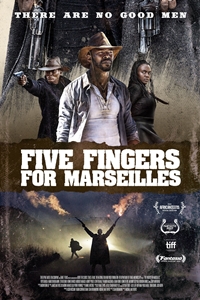Five Fingers for Marseilles (NR) ★★★
 Despite embracing the tropes one associates with the Western, Michael Matthews' Five Fingers of Marseilles transpires in an atypical locale: post-Colonial South Africa. Matthews reaffirms what Sergio Leone identified - the Western doesn't demand John Wayne, cowboys, Indians, and tumbleweeds. It's as much about an existential state as it is about a setting. Consequently, Five Fingers of Marseilles is simultaneously familiar and unique. As befits a film set in an isolated corner of the pre-and-post-Apartheid country, the movie incorporates its contemporaneous circumstances into the plot.
Despite embracing the tropes one associates with the Western, Michael Matthews' Five Fingers of Marseilles transpires in an atypical locale: post-Colonial South Africa. Matthews reaffirms what Sergio Leone identified - the Western doesn't demand John Wayne, cowboys, Indians, and tumbleweeds. It's as much about an existential state as it is about a setting. Consequently, Five Fingers of Marseilles is simultaneously familiar and unique. As befits a film set in an isolated corner of the pre-and-post-Apartheid country, the movie incorporates its contemporaneous circumstances into the plot.
Sean Drummond's screenplay opens with a nearly 20-minute long prologue that introduces the six main characters as children and illustrates the tension that exists in the rural town of Marseilles between the cruel white landowners and the poverty-stricken blacks, who inhabit the rundown outskirts. Things boil over when the girl in the group, Lerato, is kidnapped by a white police officer. The boys track her down and, in a scene that's shocking for its matter-of-factness, Tau (who gains the nickname of "The Lion of Marseilles") shoots and kills both the kidnapper and his associate. Following this action, Tau flees, leaving the others to face the consequences of his actions while he lives the next 20 years committing petty crimes and spending time behind bars.
The main story focuses on Tau's return. Now a world-weary man in his mid-30s, The Lion of Marseilles (Vuyo Dabula) comes back because he has nowhere else to go. In his hometown, much has changed yet corruption and graft remain defining characteristics. Criminal gangs have replaced whites. The civilized portion of Marseilles is now run by one of Tau's old comrades, the wealthy Pockets (Kenneth Nkosi), who has made a deal with the bandit leader Ghost (Hamilton Dhlamini). In return for staying out of Pockets' portion of town, Ghost and his underlings can have free reign over everything else, including the saloon owned by Lerato (Zethu Dlomo) and her father. Tau's return excites a great deal of interest (not all positive) and he learns that his brother is dead and he has a nephew, the hotheaded Sizwe (Lizwi Vilakazi). Tau recognizes almost immediately that a new group of vigilantes - a revived "Five Fingers" - is needed to confront the danger represented by Ghost.
The shadow of Leone (and, by extension, Kurosawa) looms large over Five Fingers for Marseilles, from the manner in which certain shots are framed to the way Tau identifies himself (as "Nobody," an obvious reference to Clint Eastwood's Man with No Name). Thematically, however, this is very much a revisionist Western, seeking deeper meaning than simple revenge. This is more like Eastwood in Unforgiven than Eastwood in A Fistful of Dollars. None of the "good guys" are without blemish and at least some of the "bad guys" have relatable reasons for their actions. And, though Tau's goal of cleaning up Marseilles is laudable, there's a sense that, even if he succeeds, it will be futile. Indeed, the screenplay leaves a lot of messy loose ends, including ambiguity about the fates of several characters.
Matthews ensures that Marseilles' specific geography, which is critical to understanding the narrative, is clearly delineated. He relies in part on his cinematographer, Shaun Lee, for this. Lee contributes many impressive shots, emphasizing the geographical similarities between South Africa's Eastern Cape and America's Old West. While there are gunfights and everything concludes with a big shoot-out, the complexity of the situation and the murkiness of Tau's quest for redemption are anything but standard-order fare for a Western. Marred only by an overlong running time that occasionally results in dead spots, Five Fingers of Marseilles is a solid modern-day Western with much to distinguish it from the predecessors obviously respected and admired by director Matthews.
© 2018 James Berardinelli
To get the full Quicklook Films experience, uncheck "Enable on this Site" from Adblock Plus
box office top 10

Challengers Released: April 26, 2024 Cast: Zendaya, Josh O'Connor 15M

Unsung Hero Released: April 26, 2024 Cast: Daisy Betts, Joel Smallbone 7.8M

Godzilla x Kong: The New Empire Released: March 29, 2024 Cast: Rebecca Hall, Brian Tyree Henry 7.2M

Civil War Released: April 12, 2024 Cast: Kirsten Dunst, Wagner Moura 7M

Abigail Released: April 19, 2024 Cast: Melissa Barrera, Dan Stevens 5.3M

The Ministry of Ungentlemanly Warfare Released: April 19, 2024 Cast: Henry Cavill, Eiza Gonzalez 3.9M

Kung Fu Panda 4 Released: March 8, 2024 Cast: Jack Black, Viola Davis 3.6M

Ghostbusters: Frozen Empire Released: March 22, 2024 Cast: Paul Rudd, Carrie Coon 3.3M

Dune: Part Two Released: March 1, 2024 Cast: Timothée Chalamet, Zendaya 2M

Boy Kills World Released: April 26, 2024 Cast: Bill Skarsgård, Famke Janssen 1.7M






